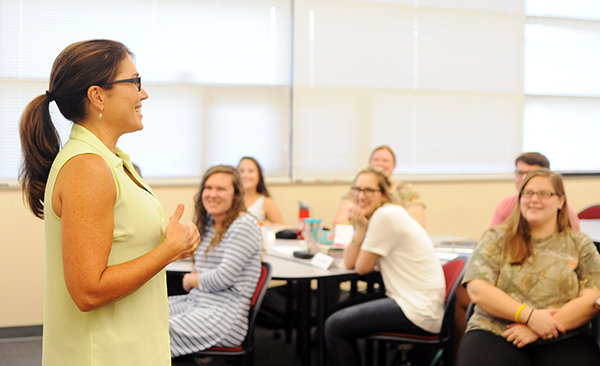News
Dalton State to Offer Autism Endorsement
11/03/16
 Learell Faulk knows what it’s like to be a child struggling to sit still in school long enough to learn.
Learell Faulk knows what it’s like to be a child struggling to sit still in school long enough to learn.
Even into adulthood, Faulk experienced symptoms from attention deficit disorder that made it hard to thrive in a traditional classroom setting. Though ADD isn’t on the autism spectrum, he does understand how hard can be to function in an environment that’s not conducive to his needs.
“When I heard that Dalton State’s School of Education was going to begin offering an autism spectrum disorders endorsement, I knew I wanted to enroll in that program,” said Faulk, who will be graduating with a degree in early childhood education from Dalton State in the spring. “I want that extra expertise in my skill set as a teacher. It’s not about lettering in another sport. It’s about being better in the classroom.”
The autism endorsement was approved by the Georgia Professional Standards Commission recently, and classes will be offered spring semester.
The endorsement is designed to help those working with children on the autistic spectrum. Classes for the endorsement are open to many interested, not just those accepted into the School of Education.
This credential can be earned by undergraduate teacher candidates and certified professionals who wish to gain knowledge in the area of teaching students with autism. It can also be added to existing teaching certifications. Other professionals from related fields who have specific interest in serving students with autism may also seek this endorsement.
Courses will be offered on a flexible schedule, making it easier for professionals to complete the program, said Dr. Roben Taylor, assistant professor of special education, who has spearheaded the effort to obtain the endorsement.
“This will teach how to help students with autism learn,” Taylor said. “The Center for Disease Control monitors cases of autism and their latest numbers, which are from 2012, indicate one in 68 children has some form of autism. Since it’s a spectrum, it affects each child differently. And now with inclusion classes in our schools, teachers are likely to have at least one child on the spectrum in their class. This endorsement is specifically for autism, but it will equip teachers, parents, or anyone else with tools they need to help children with any special need.”
Autism is becoming better understood and more prevalent. According to the CDC, 1 in 168 children were diagnosed with autism in 2000. The rate has gone from 6.7 percent of children diagnosed in 2000 to 14.6 percent in 2012.
“Though the cause of autism isn’t yet known, more research is developing, and more even more is understood about the spectrum,” Taylor said. “For a student with autism, looking at a teacher may be distracting. That may lead the teacher to believe the student is not listening. They don’t follow social standards of communicating. They don’t know how to interact sometimes.
“Many on the spectrum are often brilliant and have an above average IQ. So the problem isn’t that they aren’t smart enough to do the work. The environment is the problem. It’s very easy for these children to have a sensory overload – everything is too loud or too bright.”
The three-class endorsement is designed to educate students on research-based assessments, intervention, instruction, and program management for students on the spectrum.
“We are very pleased to be able to offer this endorsement,” said Dr. Sharon Hixon, dean of the School of Education. “We have quite a bit of interest from students to continue their professional preparation beyond the programs we currently offer. I’m proud of the work Dr. Taylor completed in the development of this program. She consulted other experts in the field to develop courses, assessments, field experiences, and curriculum.”
During Faulk’s field experience as part of his early childhood education degree, he has observed and taught many children on the autistic spectrum. He understands the challenge teachers sometimes face having students with different needs all in the same room.
“I thought I’d have the answers needed,” he said. “I thought I’d be the person who could break through to that child with autism and explain things the way they need. And that didn’t happen. Those students are just as eager to learn and grasp the work as any other student there. That helps you work through the frustration of ‘Why can’t you get this?’ you face as a teacher. So I think this is a great endorsement. I see the importance of this program.”
For more information on the autism endorsement, contact the School of Education at 706-272-2362.
